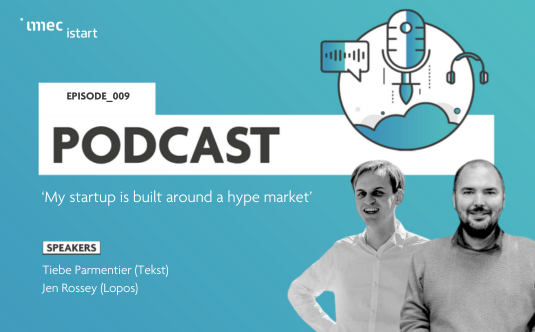Imec.istart PODCAST #13 I’m in Love with a Little Piece of My Big Pie
Do you want to have your pie and eat it, too? You’re not alone. We all want as much of that pie as we can get, but...if you’re a startup founder, satisfaction with a small slice of that pie – not the whole thing – is the key to success.
Isabelle Tennstedt (Seeder Fund), Kris Vandenberk (imec.istart Future Fund), and Tim Clijmans’ (DEO) insights on ownership, funding, the macroeconomic climate, and the power of tight-knit teams give startup founders plenty of food for thought. Even better – they give you tools to minimise share dilution in startup funding and stay strong in the early stages of your journey. Keep reading to find out how.
Startup funding dos and don’ts
These aren’t hard and fast rules. They’re a guideline. After all, in the podcast, you’ll hear that pre-seed and early-stage funding is more an art than a science’.
Think lean: the lean startup preserves a meaningful stake for founders.
Startup growth is all about striking a good balance between what you can do on your own and what you can’t. At some point, you’ll need external funding to scale up, and that means ceding a slice of your pie (i.e. ownership). Incremental growth and smart investment keep you from overshooting, help attract helpful capital and minimise dilution.
DO
- Maximise your capital. Use what you have as efficiently as possible. A tight operation and verifiable growth boost your eligibility for subsequent funding rounds.
- Remember, timing is everything. Young founders can live with ‘less is more’ more easily than older ones. If you already have significant fixed costs, you’ll need to compensate.
DON’T
- Give too much equity away too soon in the game. (Too many investors = no pie for you.)
- Give yourself a fat paycheck. A high salary now means less equity later.
‘We started out working lean, going as far as we could with our own means and the money we were generating from other activities.’ – Tim on DEO -
Investors are a must for growth: choose wisely.
Your startup is your baby, and like any good parent, you don’t want it to leave the nest too soon. But...you also want it to grow, right?
DO
- Be discerning. Select investors based on their skill set and your funding stage.
- Consider the big picture. Select investors based on how their expertise and connections could contribute to your growth.
Ask potential investors lots of questions. Try to understand their point of view.
DON’T
- Fixate on money. Founders need investors with the right chops to help them grow sustainably and maintain ownership.
- Forget to be transparent. Make sure to have clear agreements on hard-hitting issues like liquidation preference.
‘So, I think founders should realise that valuation is really only one part, while governance and anti-dilution are also a significant part of the equation.’ – Isabelle Tennstedt
Large funding rounds: approach with caution.
Plenty of startups are lured into large funding rounds, hoping for big money and a bigger slice of that pie. Unfortunately, they’re also time-consuming and a huge energy sink.
DO
- Consider working with non-dilutive funding options instead. Convertible loans are a great way to avoid getting bogged down with valuation and are great for short-term fundraising.
DON’T
- Wade into the large funding round pool if you’re pre-seed. It’s not a good use of your time, energy, or money.
Macroeconomics: the rules of the game have changed, pivot accordingly.
The investment climate is risk averse, and the days of business angels swooping in to the startup’s rescue are over. Investors want higher returns and lower risk and actively avoid early-stage funding. (*Part of why the good people at Future Fund and Seeder Fund are bridging the gap!)
DO
- Remember that valuations are governed by interest rates. Venture capitalists (VCs) are looking for sustainable companies and startups that burn money and create tons of value.
- Plan carefully. It will probably take you at least half a year to raise moneyon this route.
- Weigh whether you’re default alive or default investable. If you’re default investable, raising funds will be easier.
- Make sure you’re in the money to attract investors in a risk-averse climate.
Teamwork makes the dream work.
So cliché, it’s cringe – but it’s true. Startups need co-founders with strong complementary skill sets, and recruitment during early-stage funding (pre-seed + A and B rounds) is crucial. Team composition can make or break your startup.
‘You need the right people at the right time in the life cycle of a company in order to efficiently scale up.’ – Kris Vandenberk
DO
- Look for highly skilled players who have what you lack and believe in your startup’s mission. Motivation is a must because salaries won’t be high starting out.
- Hire with growth and the long term in mind. Your first recruits play a pivotal role in your startup’s success.
- Consider stock options as an incentive.
DON’T
- Forget to mention relevant clauses and explain common startup buzzwords and jargon.
These are just a few of the insights our guests shared with us in the podcast. If we’ve piqued your curiosity, click to listen to the whole podcast.
Recommended Readings:
- The Founder’s Dilemmas: Anticipating and Avoiding the Pitfalls That Can Sink a Startup by Noam T. Wasserman
- Deal Terms: The Finer Points of Venture Capital Deal Structures, Valuations, Term Sheets, Stock Options and Getting Deals Done by Alex Wilmerding
- Kellblog by advisor, director, consultant, angel investor, and blogger focused on enterprise software startups – Dave Kellogg.


